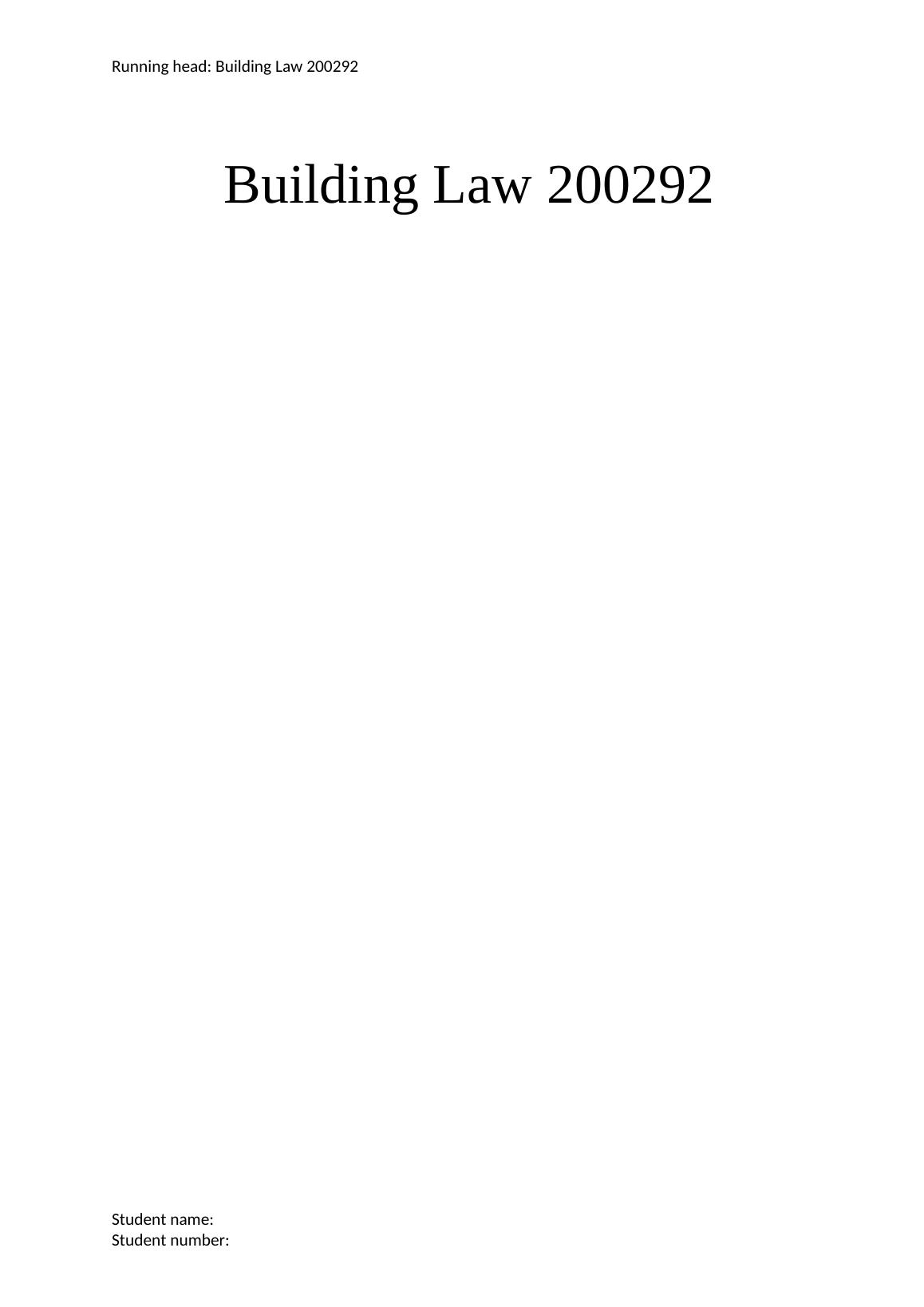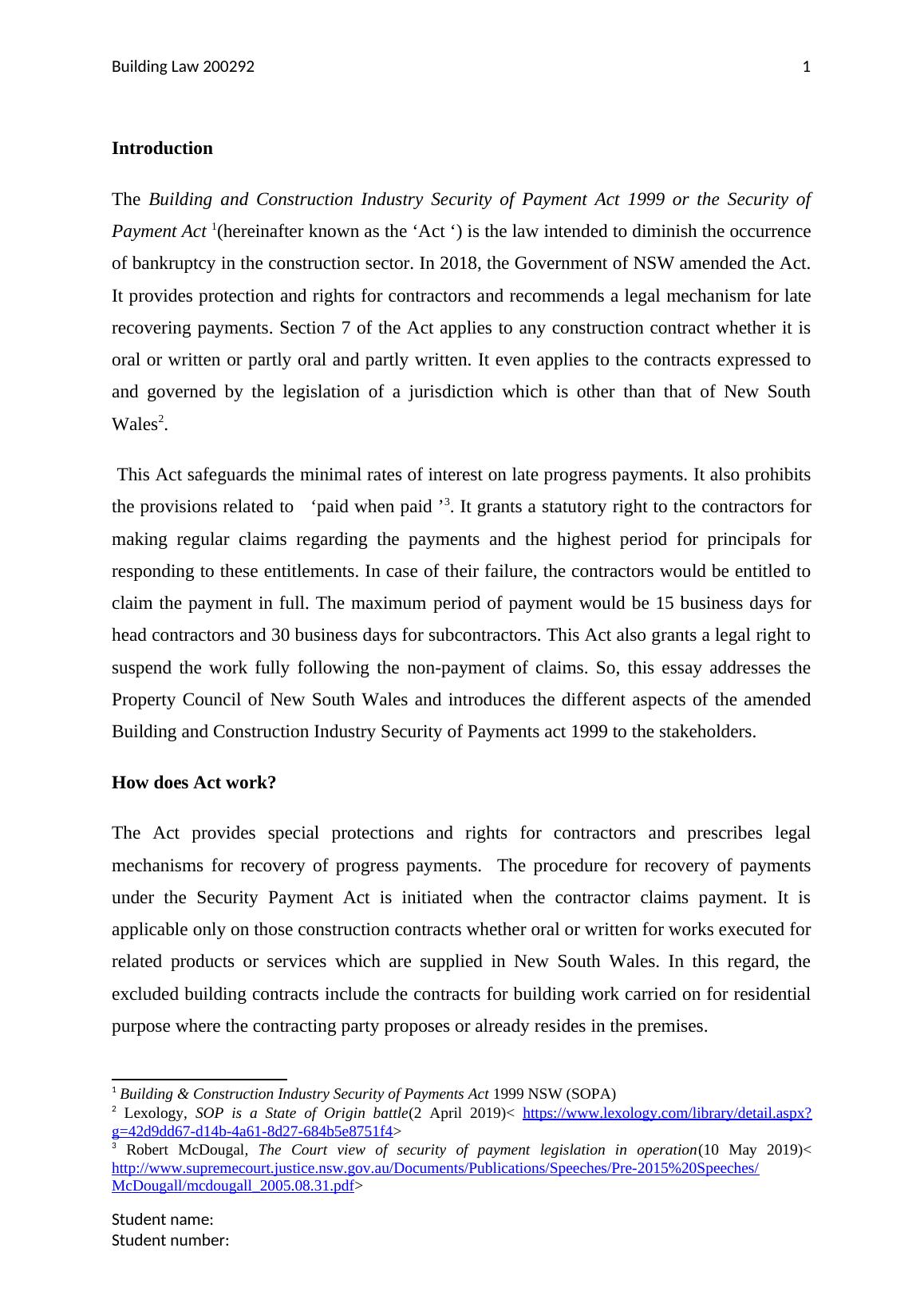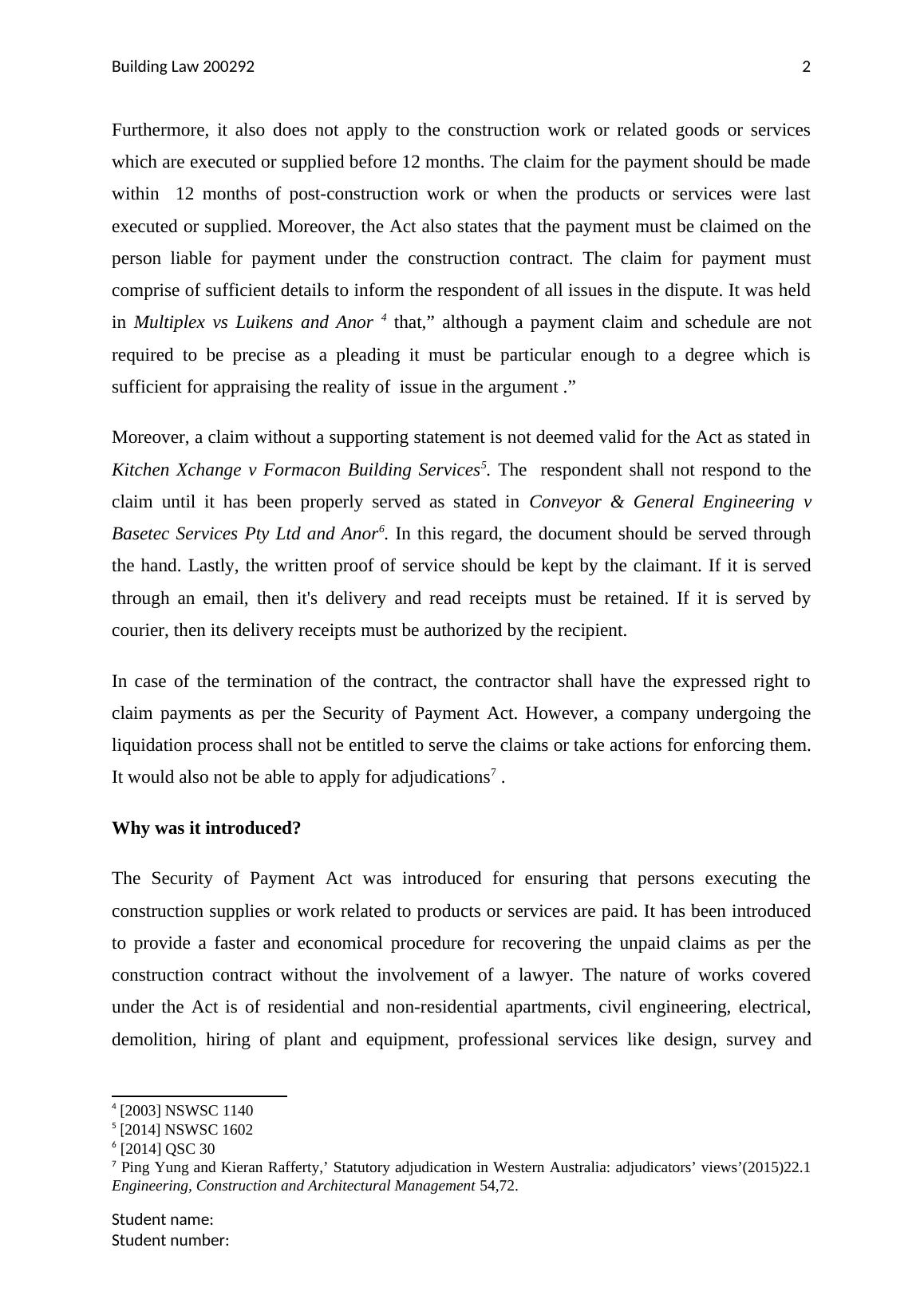Building and Construction Industry Security of Payment Act 1999 - Desklib
Added on 2022-11-09
9 Pages2434 Words155 Views
Running head: Building Law 200292
Building Law 200292
Student name:
Student number:
Building Law 200292
Student name:
Student number:

Building Law 200292
1
Introduction
The Building and Construction Industry Security of Payment Act 1999 or the Security of
Payment Act 1(hereinafter known as the ‘Act ‘) is the law intended to diminish the occurrence
of bankruptcy in the construction sector. In 2018, the Government of NSW amended the Act.
It provides protection and rights for contractors and recommends a legal mechanism for late
recovering payments. Section 7 of the Act applies to any construction contract whether it is
oral or written or partly oral and partly written. It even applies to the contracts expressed to
and governed by the legislation of a jurisdiction which is other than that of New South
Wales2.
This Act safeguards the minimal rates of interest on late progress payments. It also prohibits
the provisions related to ‘paid when paid ’3. It grants a statutory right to the contractors for
making regular claims regarding the payments and the highest period for principals for
responding to these entitlements. In case of their failure, the contractors would be entitled to
claim the payment in full. The maximum period of payment would be 15 business days for
head contractors and 30 business days for subcontractors. This Act also grants a legal right to
suspend the work fully following the non-payment of claims. So, this essay addresses the
Property Council of New South Wales and introduces the different aspects of the amended
Building and Construction Industry Security of Payments act 1999 to the stakeholders.
How does Act work?
The Act provides special protections and rights for contractors and prescribes legal
mechanisms for recovery of progress payments. The procedure for recovery of payments
under the Security Payment Act is initiated when the contractor claims payment. It is
applicable only on those construction contracts whether oral or written for works executed for
related products or services which are supplied in New South Wales. In this regard, the
excluded building contracts include the contracts for building work carried on for residential
purpose where the contracting party proposes or already resides in the premises.
1 Building & Construction Industry Security of Payments Act 1999 NSW (SOPA)
2 Lexology, SOP is a State of Origin battle(2 April 2019)< https://www.lexology.com/library/detail.aspx?
g=42d9dd67-d14b-4a61-8d27-684b5e8751f4>
3 Robert McDougal, The Court view of security of payment legislation in operation(10 May 2019)<
http://www.supremecourt.justice.nsw.gov.au/Documents/Publications/Speeches/Pre-2015%20Speeches/
McDougall/mcdougall_2005.08.31.pdf>
Student name:
Student number:
1
Introduction
The Building and Construction Industry Security of Payment Act 1999 or the Security of
Payment Act 1(hereinafter known as the ‘Act ‘) is the law intended to diminish the occurrence
of bankruptcy in the construction sector. In 2018, the Government of NSW amended the Act.
It provides protection and rights for contractors and recommends a legal mechanism for late
recovering payments. Section 7 of the Act applies to any construction contract whether it is
oral or written or partly oral and partly written. It even applies to the contracts expressed to
and governed by the legislation of a jurisdiction which is other than that of New South
Wales2.
This Act safeguards the minimal rates of interest on late progress payments. It also prohibits
the provisions related to ‘paid when paid ’3. It grants a statutory right to the contractors for
making regular claims regarding the payments and the highest period for principals for
responding to these entitlements. In case of their failure, the contractors would be entitled to
claim the payment in full. The maximum period of payment would be 15 business days for
head contractors and 30 business days for subcontractors. This Act also grants a legal right to
suspend the work fully following the non-payment of claims. So, this essay addresses the
Property Council of New South Wales and introduces the different aspects of the amended
Building and Construction Industry Security of Payments act 1999 to the stakeholders.
How does Act work?
The Act provides special protections and rights for contractors and prescribes legal
mechanisms for recovery of progress payments. The procedure for recovery of payments
under the Security Payment Act is initiated when the contractor claims payment. It is
applicable only on those construction contracts whether oral or written for works executed for
related products or services which are supplied in New South Wales. In this regard, the
excluded building contracts include the contracts for building work carried on for residential
purpose where the contracting party proposes or already resides in the premises.
1 Building & Construction Industry Security of Payments Act 1999 NSW (SOPA)
2 Lexology, SOP is a State of Origin battle(2 April 2019)< https://www.lexology.com/library/detail.aspx?
g=42d9dd67-d14b-4a61-8d27-684b5e8751f4>
3 Robert McDougal, The Court view of security of payment legislation in operation(10 May 2019)<
http://www.supremecourt.justice.nsw.gov.au/Documents/Publications/Speeches/Pre-2015%20Speeches/
McDougall/mcdougall_2005.08.31.pdf>
Student name:
Student number:

Building Law 200292
2
Furthermore, it also does not apply to the construction work or related goods or services
which are executed or supplied before 12 months. The claim for the payment should be made
within 12 months of post-construction work or when the products or services were last
executed or supplied. Moreover, the Act also states that the payment must be claimed on the
person liable for payment under the construction contract. The claim for payment must
comprise of sufficient details to inform the respondent of all issues in the dispute. It was held
in Multiplex vs Luikens and Anor 4 that,” although a payment claim and schedule are not
required to be precise as a pleading it must be particular enough to a degree which is
sufficient for appraising the reality of issue in the argument .”
Moreover, a claim without a supporting statement is not deemed valid for the Act as stated in
Kitchen Xchange v Formacon Building Services5. The respondent shall not respond to the
claim until it has been properly served as stated in Conveyor & General Engineering v
Basetec Services Pty Ltd and Anor6. In this regard, the document should be served through
the hand. Lastly, the written proof of service should be kept by the claimant. If it is served
through an email, then it's delivery and read receipts must be retained. If it is served by
courier, then its delivery receipts must be authorized by the recipient.
In case of the termination of the contract, the contractor shall have the expressed right to
claim payments as per the Security of Payment Act. However, a company undergoing the
liquidation process shall not be entitled to serve the claims or take actions for enforcing them.
It would also not be able to apply for adjudications7 .
Why was it introduced?
The Security of Payment Act was introduced for ensuring that persons executing the
construction supplies or work related to products or services are paid. It has been introduced
to provide a faster and economical procedure for recovering the unpaid claims as per the
construction contract without the involvement of a lawyer. The nature of works covered
under the Act is of residential and non-residential apartments, civil engineering, electrical,
demolition, hiring of plant and equipment, professional services like design, survey and
4 [2003] NSWSC 1140
5 [2014] NSWSC 1602
6 [2014] QSC 30
7 Ping Yung and Kieran Rafferty,’ Statutory adjudication in Western Australia: adjudicators’ views’(2015)22.1
Engineering, Construction and Architectural Management 54,72.
Student name:
Student number:
2
Furthermore, it also does not apply to the construction work or related goods or services
which are executed or supplied before 12 months. The claim for the payment should be made
within 12 months of post-construction work or when the products or services were last
executed or supplied. Moreover, the Act also states that the payment must be claimed on the
person liable for payment under the construction contract. The claim for payment must
comprise of sufficient details to inform the respondent of all issues in the dispute. It was held
in Multiplex vs Luikens and Anor 4 that,” although a payment claim and schedule are not
required to be precise as a pleading it must be particular enough to a degree which is
sufficient for appraising the reality of issue in the argument .”
Moreover, a claim without a supporting statement is not deemed valid for the Act as stated in
Kitchen Xchange v Formacon Building Services5. The respondent shall not respond to the
claim until it has been properly served as stated in Conveyor & General Engineering v
Basetec Services Pty Ltd and Anor6. In this regard, the document should be served through
the hand. Lastly, the written proof of service should be kept by the claimant. If it is served
through an email, then it's delivery and read receipts must be retained. If it is served by
courier, then its delivery receipts must be authorized by the recipient.
In case of the termination of the contract, the contractor shall have the expressed right to
claim payments as per the Security of Payment Act. However, a company undergoing the
liquidation process shall not be entitled to serve the claims or take actions for enforcing them.
It would also not be able to apply for adjudications7 .
Why was it introduced?
The Security of Payment Act was introduced for ensuring that persons executing the
construction supplies or work related to products or services are paid. It has been introduced
to provide a faster and economical procedure for recovering the unpaid claims as per the
construction contract without the involvement of a lawyer. The nature of works covered
under the Act is of residential and non-residential apartments, civil engineering, electrical,
demolition, hiring of plant and equipment, professional services like design, survey and
4 [2003] NSWSC 1140
5 [2014] NSWSC 1602
6 [2014] QSC 30
7 Ping Yung and Kieran Rafferty,’ Statutory adjudication in Western Australia: adjudicators’ views’(2015)22.1
Engineering, Construction and Architectural Management 54,72.
Student name:
Student number:

End of preview
Want to access all the pages? Upload your documents or become a member.
Related Documents
Building and Construction Industry Security and Payment Act 1999lg...
|9
|2740
|486
Building Law: Examining the Building and Construction Industry Security of Payment Act 1999lg...
|9
|2763
|321
Building Law: An Overview of Building and Construction Industry Security of Payment Act 1999 in New South Waleslg...
|7
|2005
|389
Building and Construction Industry Security of Payments Act 1999 (NSW)lg...
|9
|2440
|196
Building Law: Construction Industry Security of Payments Act 1999lg...
|12
|2285
|449
The Property Council of New South Wales on the Building And Construction TABLE OF CONTENTS INTRODUCTION 1 MAIN BODY1lg...
|9
|2726
|243